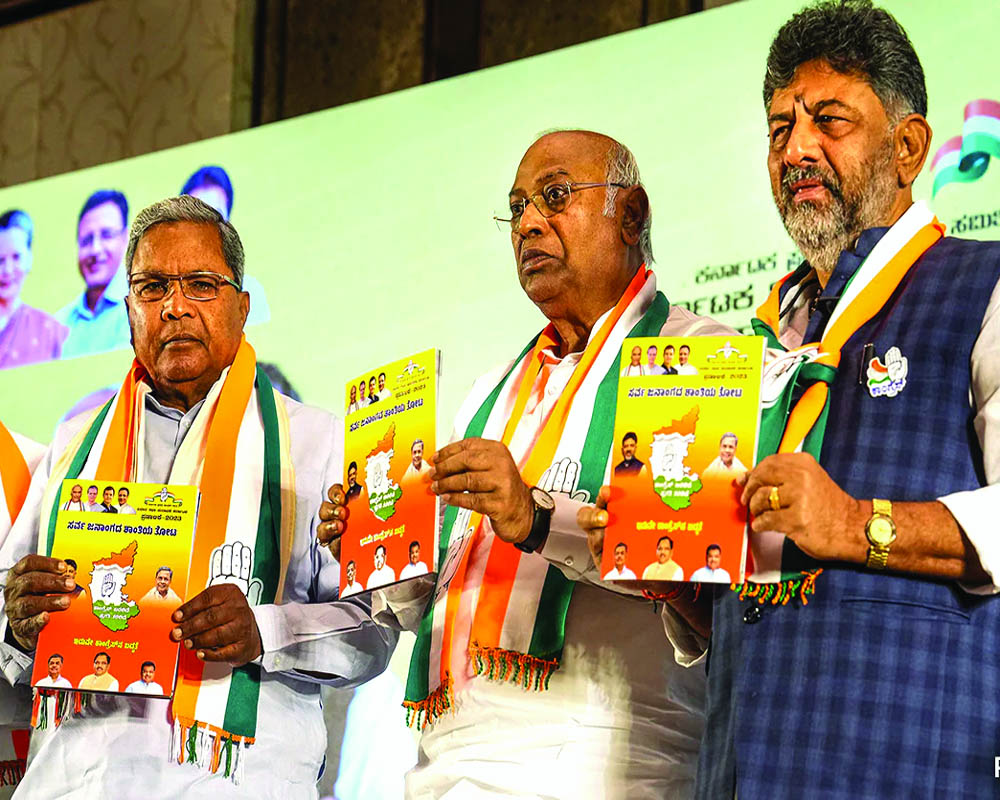Karnataka’s debt has been increasing at double the rate of its GSDP, which makes it unsustainable. Freebies will put an extra burden on its economy
Lots have been written on the Karnataka election results. There have been threadbare analyses of why the BJP has lost the elections despite the strong economic performance of the state, how the people have expressed their anger over high prices and perceived corruption and how this emphatic victory for the Congress after a prolonged dry spell has re-energised its demoralised cadres while fostering opposition unity by showcasing a new winning formula. This high hope may yet prove to be elusive. Karnataka is a paradox of sorts – in other developed states, economic stability generally brings political continuity, but Karnataka defies this trend. During the last 35 years from 1988, the State had as many as 18 different governments, and been under the President’s rule four times, while the state has continued to grow all the while. The change of government at every election is a facet of this, and need not be an indicator of people’s disenchantment with any party or government.
Now that the dust has settled, the government has begun to focus on the business of governance and on fulfilling its election promises. In one of the first decisions taken by the Siddaramaiah government, the cabinet has cleared the implementation of the party’s ‘five election guarantees’ promised to voters in its election manifesto. These are Gruha Jyoti to provide 200 units of free power to all households, Gruha Laskshmi to pay Rs 2,000 monthly assistance to the woman head of every family, Anna Bhagya to provide 10 kilograms of rice free to every member of a below poverty line (BPL) household, Yuva Nidhi to pay Rs 3,000 every month to unemployed graduate youth and Rs 1,500 for unemployed diploma holders aged 18-25 for two years, and finally, Shakti to allow free travel for women in public transport.
There are many other populist promises in the manifesto, like filling up vacancies in all government departments within a year. Given that a third of the total 769,000 government jobs are lying vacant, this will be challenging not only to recruit but also to pay. The poll manifesto also promised to “sympathetically consider extension of OPS (Old Pension Scheme) to pensionable staff who joined service after 2006”, which will make it the sixth Indian state to have reverted to the OPS after Rajasthan, Chattisgarh, Jharkhand, Punjab and Himachal Pradesh, all ruled by the opposition.
The manifesto has further promised to increase public health expenditure to 5 per cent of the Gross State Domestic Product (GSDP) in line with the recommendations of the National Health Policy. It would be interesting to know where they would get the resources for all this, about which, of course, the manifesto is blissfully silent. In our politics, votes are all that matters and any cost to purchase them is never too high. This winning formula is sure to be applied with increasing vigour in the upcoming elections in MP, Telangana, Rajasthan and Chattisgarh, and even the BJP may be forced to join the bandwagon. It would be interesting to see their impact on the state and national finances.
The Economic Survey of Karnataka for FY 2021-22 aspired to make Karnataka a trillion-dollar economy by 2032, when India’s GDP is likely to be 10 trillion dollars. Currently, Karnataka’s economy as measured by its GSDP is only around $260 billion. To reach the target of $1 trillion by 2032, it needs to grow at an annual compound average rate (CAGR) of 15 per cent annually, a difficult but not impossible target if the finances are managed well. Last year, its nominal GSDP grew by 14 per cent. Its per capita income of around $4000 is almost twice that of India and is among the top five states of India. But the high income conceals its skewed distribution – services claim two-thirds of its GSDP - which is a product of its digital economy worth $60 billion largely centred around the capital Bengaluru.
Karnataka’s prosperity hides its severe indebtedness, an outcome of its populist culture. In 2017-18, Karnataka gave a farm loan waiver for Rs 18000 crore which was expanded to Rs 44000 in the next fiscal. No other state has given such a huge largesse to farmers. In FY 21, its fiscal deficit (FD) of Rs 67,098 crore was 3.7 per cent of its GSDP of Rs 18 lakh crore. The high FD ratio understandably was a result of Covid-19 due to which its limit was raised from 3 to 5 per cent by the Karnataka Fiscal Responsibility Ac. Its outstanding liability of Rs 4.3 lakh crore was almost 24 per cent of GSDP.
Karnataka’s debt has been increasing at almost double the rate of its GSDP, which makes it fundamentally unsustainable. Its interest payment at 14.95 per cent of revenue receipt already was way above the fiscal consolidation target of 9.15 per cent prescribed by the Fifteenth Finance Commission. The manifesto guarantees and freebies will cost the exchequer an estimated Rs 62000 crore, more than the estimated fiscal deficit of Rs 60581 crore, or 2.6 per cent of GSDP, for FY23.
This means that the prosperous state will sink deeper and deeper into debt which will severely restrict its capital outlay, thereby affecting its future growth. But good economics has never been good politics in Indian states, and perhaps will never be.
(The author, is a former Director of General CAG and is currently a Professor at the Arun Jaitley National Institute of Financial Management)
























